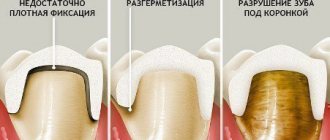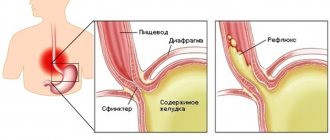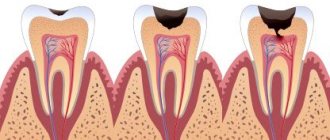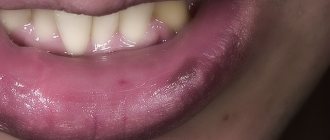Tooth extraction: swelling
Tooth extraction is a difficult operation that traumatizes the tissue surrounding the tooth. Therefore, it is not surprising that unpleasant consequences occur after tooth extraction: the most common of them is swelling. Patients often complain that after tooth extraction, the gums become swollen, swelling of the cheek or a slight gumboil appears. This is caused by partial destruction of the soft tissue around the tooth. This is unpleasant, but if the tumor is small, it goes away on its own in 2-3 days. To relieve swelling after tooth extraction, ice can be applied to the cheek for about 10 minutes. If the swelling has not gone away after a day, apply heat. Keep the heating pad for 20 minutes, then take a break for 10 minutes and put the heating pad back on.
Sometimes swelling can be caused by an allergy to the anesthesia. In this case, histamine, an antiallergic drug, will help. But if the swelling increases, then it may be a sign of inflammation that has arisen after tooth extraction. In this case, you should immediately consult a doctor.
Pain after tooth extraction
Another common complaint is that after tooth extraction, the gums, adjacent tooth, jaw, and throat hurt. As a rule, these are common symptoms after a traumatic procedure. They are caused by damage to the periodontal tissues and nerves, which goes away on its own after a few days. For example, if a temporary aching pain appears after tooth extraction, this is normal. To relieve discomfort, you can take painkillers. But if the pain intensifies, it is still worth visiting a doctor.
What causes the taste of blood in the mouth?
Until now, the human body remains a mystery. Despite this, we can safely say that all processes occurring in the human body have a certain pattern. Diseases and discomfort do not appear without specific reasons. For example, a runny nose begins as a result of pathogens entering the nasopharynx. Why does the taste of blood appear in the mouth and what is it connected with? There are several answers to this question. Anyone can feel and recognize the taste of blood in the mouth. This unpleasant metallic taste is difficult to confuse with something else. The characteristic taste is explained by the presence of iron in the blood, a trace element that is a component of hemoglobin. The constant feeling of the taste of blood in the mouth is a serious pathology that is quite common among patients. People suffering from this disease cannot fully taste the taste of the food they eat, and this negatively affects their appetite and, as a result, leads to weight loss, dystrophy and the development of serious diseases. If you feel the taste of blood in your mouth, then you need to find the cause of this phenomenon. It can be minor, or it can be serious and very dangerous. In any case, you shouldn’t ignore this situation. What are the reasons why you may taste blood in your mouth? The most common cause of this unpleasant taste is diseases of the oral cavity and teeth. To correctly determine the cause and find out whether the taste of blood is associated with diseases in the oral cavity, you should visit the dentist's office. Perhaps this is stomatitis - a disease that is manifested by the formation of white sores. At first they cause severe pain, and then begin to bleed. Even more serious is the cause associated with gum disease. In this situation, it is necessary to seek the help of a specialist as soon as possible and begin treatment. Bleeding gums are the main symptom of periodontal disease. If no dental disease is detected, you should pay attention to your breathing. If inflammatory processes occur in the nasopharynx and breathing is difficult, then the taste of blood may be felt. Another cause of such sensations may be medications or nutritional supplements. You should analyze everything you took in the last 14 days. It is possible that the vitamins you take are enriched with a large amount of iron or that such a trace element is present in the medications and supplements you take. If you discover that you are taking such drugs, you must temporarily stop taking them. If the taste disappears, then the reason why the taste of blood appeared has been discovered. A metallic taste may also be felt when breathing through the mouth when saliva dries quickly. In such a situation, dehydration of the oral cavity causes a specific taste. This is why asthmatics constantly taste blood during attacks. In addition to all of the above, the taste of blood in the mouth can be a signal of the appearance of diseases such as diabetes, stroke, heart attack, kidney failure, cancer. Also, internal bleeding should not be ruled out. To get rid of the unpleasant feeling of a metallic taste in the mouth, you need to find out the reason why it appeared and then eliminate it. If the problem is related to teeth, then you should consult a dentist and undergo a course of treatment. If your throat is dry, you need to drink water. If the taste of blood in the mouth does not go away for a long period, then it is necessary, without wasting precious time, to visit a medical facility. Self-medication and waiting for everything to go away on its own can end badly in such a situation.
Bleeding after tooth extraction
Immediately after a tooth is removed, there is bleeding from the socket. This is quite normal, since blood vessels rupture during surgery. In this case, the doctor will provide you with the necessary assistance. But sometimes bleeding occurs a few hours after surgery. To stop the bleeding yourself after tooth extraction, apply a small gauze swab to the hole and lightly bite it. After 15 minutes the blood stops flowing. But if the bleeding does not stop for a long time, you should consult a doctor.
Don't be alarmed if...
- If the gums around the wound and the outside of the cheek are swollen and painful. This is a natural reaction to surgery. Swelling can be reduced with cold or ice, but it will be worst around the third day after surgery, and bruising may occur. Afterwards, the swelling and pain will subside.
- If during the first hours after surgery the gums bleed slightly. We emphasize - lightly . If the bleeding is severe and a blood clot does not form in the socket, this is a reason to consult a doctor.
- If you have a mild fever, the corners of your mouth become dry and cracked. This is also a sign that the body has begun healing the wound and fighting possible bacteria.
- If you cannot open your mouth wide for the first three days after surgery. And they shouldn't.
Pus after tooth extraction
Suppuration of the socket and periodontal tissues is caused by their infection. It can happen for several reasons. Firstly, if you did not follow the dentist's instructions regarding individual oral hygiene after surgery. Secondly, the cause may be a tooth fragment remaining in the tissues after removal. Thirdly, there is a high risk of suppuration after a complex wisdom tooth extraction, for example. If the inflammation is not treated in time, then some time after removal, suppuration, a fistula on the gum, and even a cyst may appear. If pus appears at the surgical site, consult a doctor. He will find and eliminate the cause of the inflammatory process.
How to get rid of odor at home
If you have bad breath after tooth extraction, you can use traditional medicine in addition to drug therapy. With normal daily discomfort, there is no need to worry. The danger is the development of the inflammatory process. To fix the problem:
- Rinse your mouth thoroughly after eating with plain water or infusions of herbs such as sage or mint.
- To clean your tongue you need to use a specific brush.
- Avoid fast food and junk food.
- Use a decoction of chamomile and calendula. These are powerful tools for fighting inflammation. They promote wound healing. It’s not difficult to prepare a mouthwash: 1 tbsp. l. herbs are poured with 1 liter of boiling water. You need to leave for half an hour, then rinse.
- A golden mustache is often used. To carry out the procedure, squeeze the juice from the plant, then pour boiling water over it.
- Traditional healers recommend rinsing your mouth with a decoction of eucalyptus. This plant perfectly relieves the inflammatory process.
Dry socket after tooth extraction
A blood clot should remain in the socket after surgery. This is a very important part of the healing process. This clot protects the bone and nerve endings and serves to form bone tissue after tooth extraction. Therefore, you should not rinse your mouth for a day after the procedure and eat hot food - this will help the clot dissolve. But sometimes it does not form, and a dry socket appears.
Dry socket is considered a complication. It most often occurs after complex removals accompanied by significant trauma. If there is no blood clot, then the hole after tooth extraction hurts, and sometimes it seems that the ear also hurts. Often there is an unpleasant taste in the mouth. The consequence of a dry socket after a traumatic tooth extraction can be inflammation of the gums or alveolitis. Therefore, if you experience acute pain in the socket, consult a doctor immediately. He will place a tampon with a special anti-inflammatory gel on the hole. Tampons are changed until healing begins.
The most common causes of bitterness in the mouth
The cause of bitterness in the mouth is the ingress of large amounts of bile.
The main reason for the appearance of a bitter taste in the mouth is the entry of a large amount of bile into the gastrointestinal tract.
This is a secretion that is produced by the liver and is used when digesting food; normally, bile flows through the bile ducts into the duodenum.
Some foods, such as pine nuts, and medications have a choleretic effect, so they promote the production of increased amounts of bile. If it penetrates the esophagus and stomach, there is a feeling of bitterness in the mouth.
Bitterness is a sign of trouble in the digestive system; most often it appears after eating fatty, fried and other hard-to-digest foods. Normally, it should not enter the esophagus; digestive disorders occur for several common reasons:
- Digestive disorders. Usually, bitterness in the mouth is associated with stagnation of bile, in this case it is accompanied by the appearance of a yellow coating on the tongue, a metallic taste, and the urine becomes dark. An additional sign of liver dysfunction is yellowness of the skin.
- Gastroesophageal reflux disease is a disorder of the stomach in which its contents begin to leak into the esophagus. The disease is accompanied by heartburn, nausea, belching after eating, and chest pain.
- Infestation with parasites. Parasitic infestations lead to numerous disorders of the digestive tract: intestinal function is disrupted, and signs of vitamin deficiency often appear. If a parasite infestation is detected, the doctor will prescribe special anthelmintics.
- Biliary dyskinesia caused by hormonal disorders. Disruption of the thyroid gland provokes spasm of the biliary tract, resulting in a feeling of bitterness in the mouth.
- Another hormonal disorder that can provoke this unpleasant symptom is diabetes.
- A short-term feeling of bitterness in the mouth can occur after taking antibiotics due to increased load on the liver; sometimes this feeling occurs after consuming pine nuts, medications, and often occurs during pregnancy.
Alveolitis after tooth extraction
This is a serious complication caused by tooth extraction, which has several causes. This may be the presence of chronic inflammation of the tissues around the tooth - periodontitis, or a dry socket. In addition, alveolitis occurs if, after tooth extraction, a dental fragment remains in the tissues. All these factors cause infection of the hole and the development of its inflammation. 1–3 days after tooth extraction, pain occurs, followed by a specific smell from the mouth. Then these symptoms intensify, the hole becomes covered with a gray coating, and it becomes impossible to eat due to severe pain.
In this case, only a doctor will help you, who will carry out the necessary treatment and clean the hole from infection. Do not self-medicate under any circumstances - alveolitis can develop into periostitis (inflammation of the periosteum), causing an abscess and phlegmon.
Painful sensations after the removal procedure are unpleasant, but inevitable. Remember, if these sensations intensify, then in this case, complications after tooth extraction should be treated by a specialist. Do not delay visiting the dental clinic, dulling the pain with analgesics. Correct and timely treatment will help you avoid more serious complications.
Causes of prolonged bleeding
Experts identify many reasons that can lead to resumption of bleeding. Primary can begin due to vascular injury received during the procedure, hypertension, sudden surges in pressure, and even due to severe stress.
Also among the provoking factors are the use of Aspirin and other blood thinning drugs, hormonal imbalance or the usual increase in estrogen levels in women. Pathology can also develop if the rules of oral care are not followed, rinsing too vigorously, accidentally injuring the gums with the tongue or foreign objects, or eating too hard or hot food.
Another reason for close monitoring of the patient’s condition after surgery is tooth extraction due to existing gumboil or cyst. Tissues in which there is inflammation usually have greatly dilated blood vessels. You can also encounter unpleasant consequences with blood diseases, for example, with anemia or hemophilia, with diabetes mellitus, atherosclerosis, etc. To reduce the risk of bleeding in the first few days after surgery and before it, you do not need to drink alcoholic beverages.











